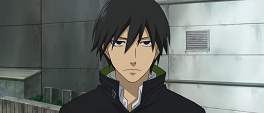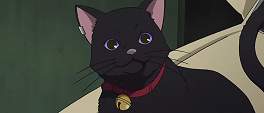Darker than Black presents itself in shades of grey: muted morality and subtle story-telling; it built itself the enviable position of being as complex and involving as you allow it to be, peeling back layer upon layer if you care to look. Unfortunately the series falls short of perfection and in its quest to provide a softly-spoken and adult narrative, it omits to fill in some of the most glaring blanks and leaves some ideas stranded out at sea.
Born from Tensai Okamura, animated by the creative powerhouse, BONES and scored by the seminal Yoko Kanno, Darker than Black was one of those projects gifted with immensely talented people and a head-start on becoming a classic. It arguable fails to achieve that illustrious title shared by so many other BONES productions but only through what it lacks rather than what it has in abundance.
BONES has proven time and time again how consistent it is with animation, seemingly immune to the sinusoidal oscillations of quality most other studios succumb to, Darker than Black pushes this quality into high-definition and retains the kind of fluid motion expected of a show with such calibre behind it. The character design is deceptively simple and belies how well each is distinguished visually: from the porcelain of Yin to the roughness of Huang, the series is refreshingly cosmopolitan in its cast with characters from all over the globe. The music is an expected and obvious high-point for the series; while not the most inventive or wide-ranging of Yoko Kanno's scores, blending elements of Wolf's Rain and Cowboy Bebop, it is noteworthy for integrating so well with each scene and its unintrusiveness.
A cohesive plot is the series' most glaring shortcoming, the two-episode nature of each story creates a kind of listlessness not helped by the lack of some more typical story-telling devices such as a solid villain or clear objective; only in the twilight of the series does it forge the latter and is all the better for it. The first few stories presented can easily lull one into believing each is self-contained, with recurring characters the only common thread; it quickly becomes apparent how connected and important some of the initial narratives are in terms of foreshadowing and context within the series as a whole. The hyperbole uttered in the first few minutes is easy to dismiss given the script's staunch refusal to repeat itself, but its face value importance is a hinge on which future events rely.
Even down to the last episode, Darker than Black refuses to reveal some of its most core secrets leaving the answers wide-open to both interpretation and speculation; it is this that is perhaps the series most infuriating aspect and despite the plethora of other good points, it can be easy to give up and label it slow and ponderous or too self-absorbed. It is true that obscurity does not beget intelligence and for those who waited for a Rosetta stone to translate all of the series' mysteries will be disappointed, but the series never attempts to be anything more than what it presents. Never falling into pithy, action-led "Contractor of the Week" or elevating itself into dense symbolism, it walks a fine line between the two, enforcing the underlying messages of duality and synergy presented throughout. The metaphors aren't hidden but neither are they well signposted while the sporadic fight set-pieces are usually swift or enacted off screen.
Whether you wish to treat the series as bi-episodic and chastise the then unsatisfactory ending or analyse each jigsaw piece to try and glean some meaning from it is fundamentally up to the viewer; the beauty and skill of Darker than Black is that both ways are possible and reveal different, mutually-inclusive facets of it.











